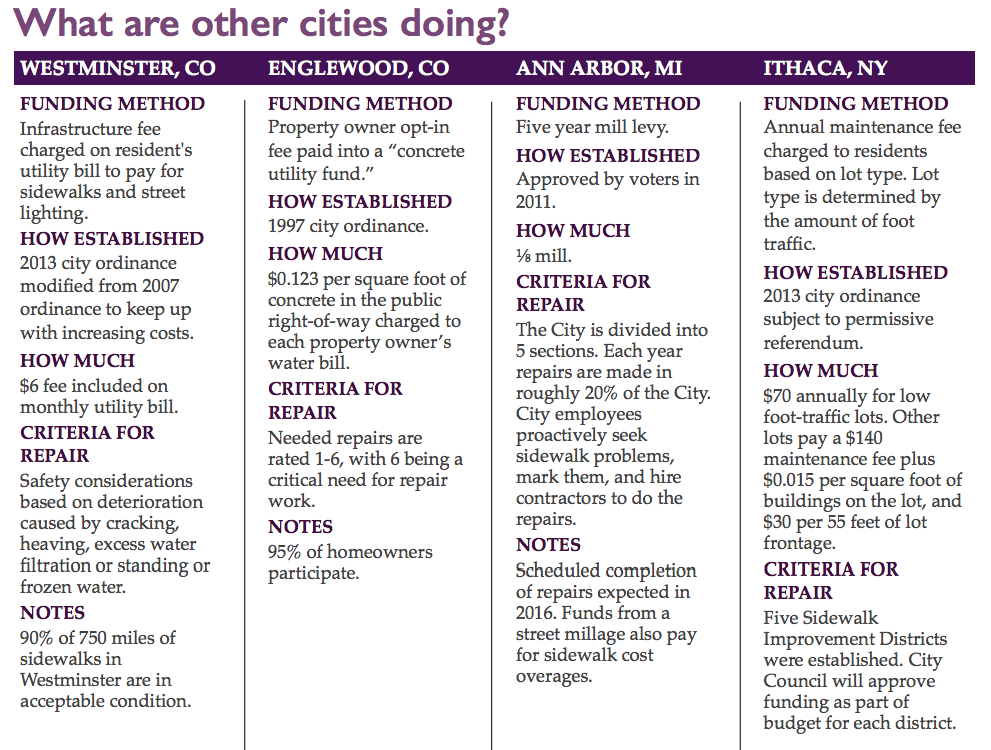Denver City Council Looks to Create Fund for a Complete Sidewalk Network
The Denver City Council is inching closer to a long-term fix for the city’s antiquated sidewalk policies, which have led to shoddy walking infrastructure and major gaps in the sidewalk network. City Councilman Paul Kashmann, who heads the Sidewalk Working Group, is looking to establish a sidewalk fund. The question is where the money will come from.

Elected officials questioned planners from Westminster, Englewood, and Ithaca, NY — cities that have come up with effective ways to fund sidewalks — during a meeting at City Hall on Wednesday. Denver’s suburbs pay for sidewalks by attaching a small fee to property owners’ utility bills. In Ithaca, residents and business owners pay an annual fee based on how much foot traffic the area has.
Denver’s current system is designed to fail: Property owners are legally responsible for maintaining their sidewalks, but that’s beyond the means of many people, plus there’s no real enforcement from Denver Public Works. As a result, the worst sidewalk conditions are concentrated in low-income neighborhoods.
If the city takes over responsibility for sidewalks, it becomes liable for their condition. Officials want to avoid what happened to Los Angeles, which is in the midst of paying off a $1.4 billion lawsuit arising from poor sidewalk maintenance.
Kashmann asked the city’s budget office to run some numbers. If every property owner — residential and commercial — paid a $5 monthly fee, it would raise about $12 million annually. “Not necessarily what we want to do, but a guide post to consider,” he said.
It’s unclear how much it would cost to give every Denver street good sidewalks, because Public Works doesn’t have a comprehensive inventory. Estimates run to the hundreds of millions, but under $1 billion. Of the streets mapped for WALKscope Denver, which is not a complete inventory, 35 percent of sidewalks were rated in very poor or poor condition. An estimated 250 miles of Denver streets don’t have sidewalks.

Most council members seem to agree that sidewalks are not “amenities,” but basic, essential components of a city. Still, some worry whether charging a fee would be politically palatable. “I think citizens expect some basic things from their city, and based on phone calls to my office, some of those things include paving and sidewalks and trash,” said City Councilwoman Kendra Black. “And I think a community engagement effort around this would be interesting, to see if people want to pay more to have those things.”
The thing is, Denver residents have already demonstrated their desire for basic walking infrastructure. WalkDenver, which has led the advocacy efforts, handed council members a petition with nearly 3,000 signatures and 34 support letters from neighborhood organizations last month. The Council has heard compelling testimony from the city’s wheelchair users and organizations that represent people with disabilities.
“I agree, as several of you have said, that we obviously need to reach out into the community to gauge the public appetite for this, but at the same time we’re looking at basic mobility and social justice issues across the city,” Kashmann said to his colleagues. “And we can’t afford to shut substantial parts of our community down for those with income and mobility impairment. We can’t push people into to the street at the same time we’re promoting Vision Zero to reduce auto-related fatalities.”
The working group will meet again next month.


